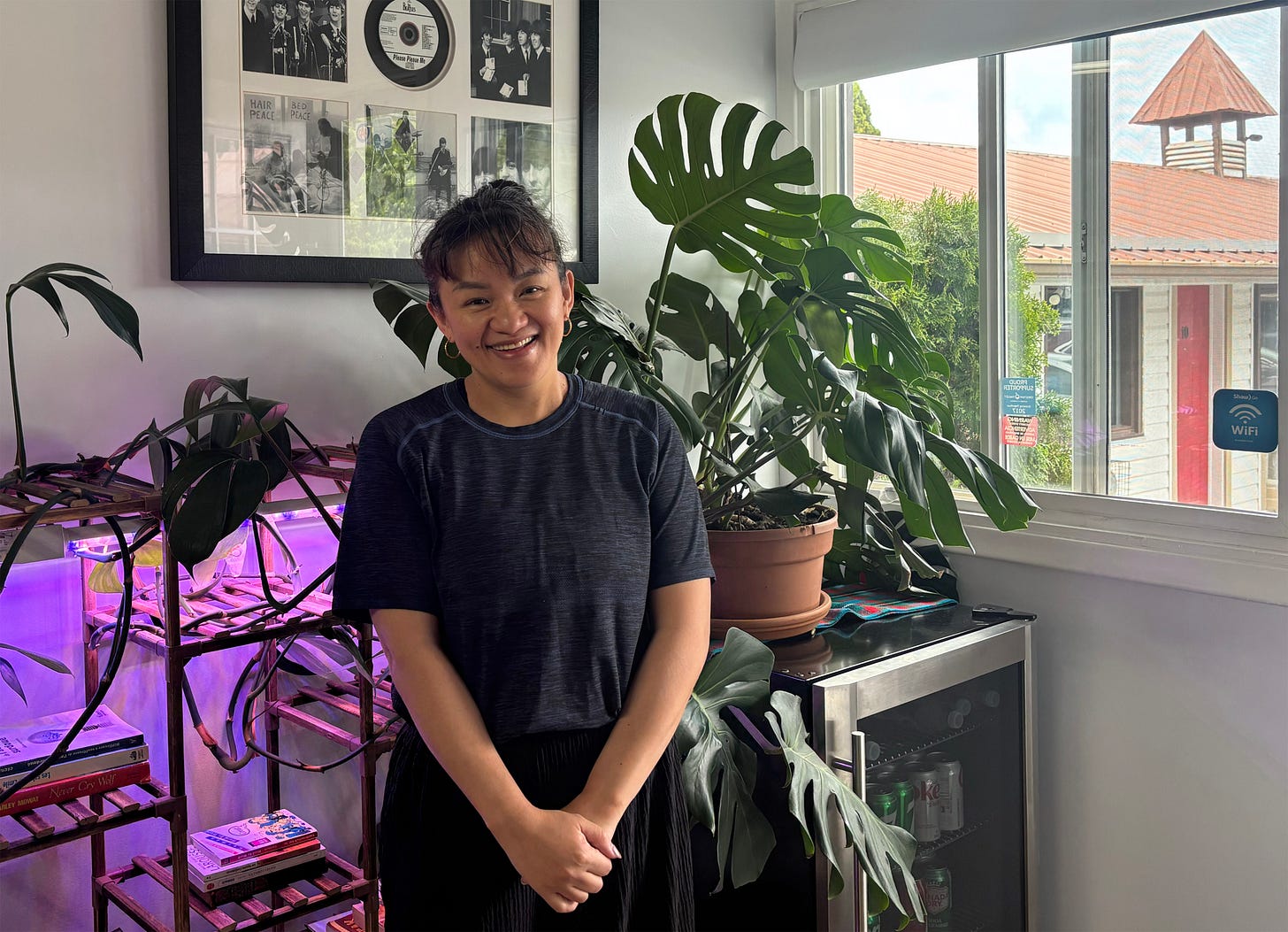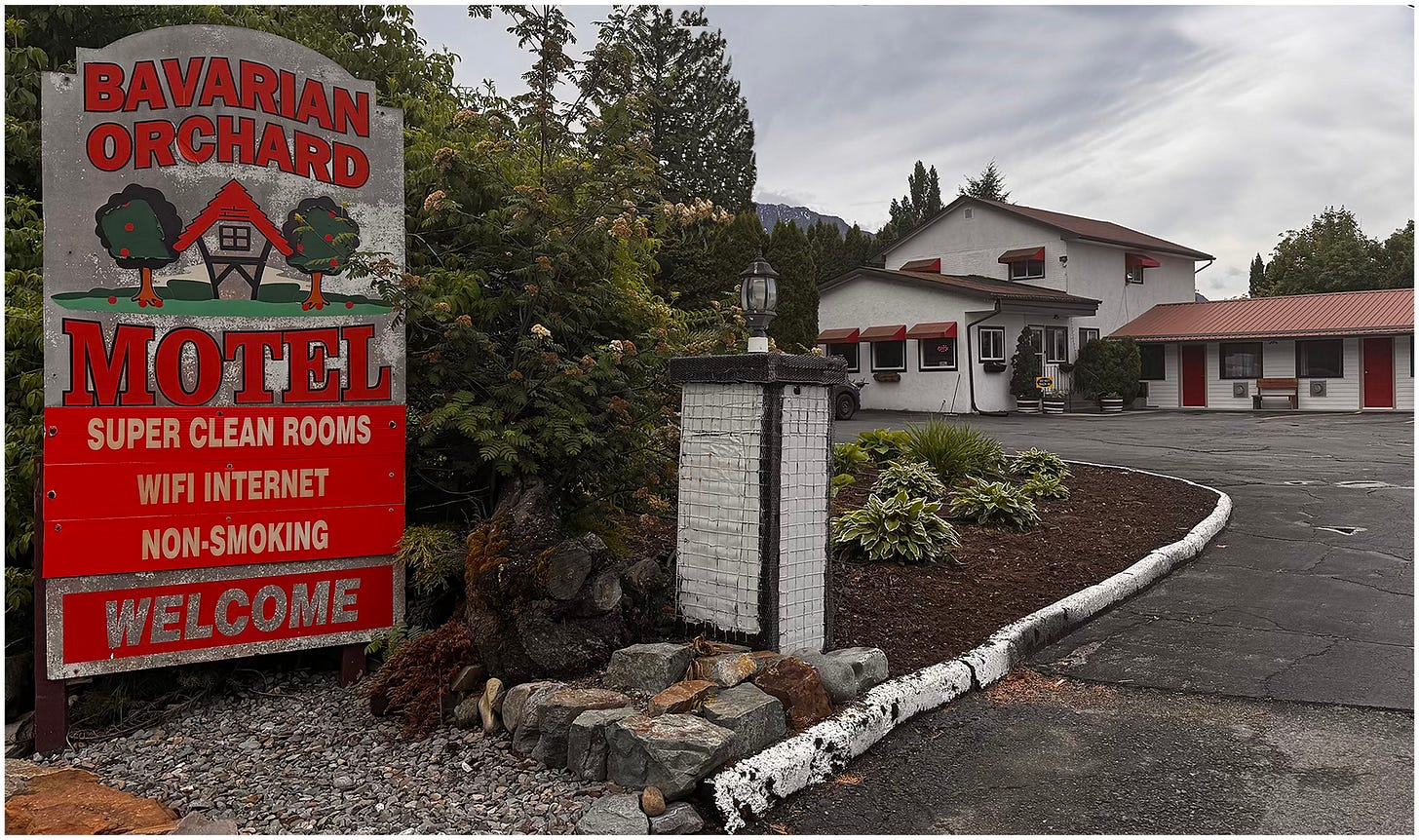Hosting Migrants/Ospitalità migrante
Once is happenstance, twice is coincidence, the third time is evidence/ Una volta è un caso, due volte è una coincidenza, tre volte è una prova (l'italiano segue l'inglese)
When after a Romanian‑run B&B and a Filipino‑owned motel, we found ourselves checking into a Punjabi family’s inn— we began to suspect we were witnessing a pattern: first‑generation immigrants are reviving rural accommodations. Trading past careers for hospitality and investing heavily in upgrades, they now prosper on guest satisfaction, reshaping Canada’s back‑road stays.

Once is happenstance
“I was in Grade 7 when Ceaușescu was overthrown and then executed,” recalls Gabriela Tanasescu, owner of Luna Bed & Breakfast in Grand Forks, thinking back to the end of dictatorship in her homeland, Romania, after the fall of the Berlin Wall. “We thought things would improve with the new regime. They didn’t. The Communists quickly reinvented themselves as democratic ‘liberals,’ and everything stayed pretty much the same.”

After finishing their studies, Gabriela and her husband Bujor emigrated to Canada. She spent years interpreting Romanian‑to‑English and, with her husband, running an import–export business—all while raising a son who is now studying mathematics at the University of Toronto. Ten years ago, Gabriela launched a new venture, opening a bed‑and‑breakfast in British Columbia’s Interior. Things are going well; there are no regrets—neither for the old country nor for those early Canadian years.
“This is home now. I couldn’t picture myself anywhere else, and this is what I love to do.” One complaint remains, though: “The winters are long. I start feeding the wood stove in October, and I’m still at it now, in mid‑May.” Still, she says, it’s a small price to pay for a dream come true.
Twice is coincidence
“I’m from Baguio City, in northern Philippines. I came to Canada in 2008 and ended up flipping burgers, fries, and patties at a McDonald’s in Red Deer, Alberta,” says Susan Dulaycan, the owner of the Bavarian Orchard Motel in Creston, British Columbia. “We moved around Alberta several times—partly for work, partly to reunite with family—going from Red Deer to Knighton Junction, then to Edson, and finally to the Crowsnest Pass in Blairmore, where we stayed about five years before landing here.”
It was 2017 when she and her husband arrived in Creston, seizing the chance to buy the Bavarian Motel from its original German owners. “We poured our life savings into it and took out a large commercial loan at what were very high interest rates then. We started renovating every room, one by one. It’s a seasonal business, so we see big spikes—especially from June to August, when the work leaves little time for anything else. But things are going well, and our children—a 21‑year‑old daughter and a 12‑year‑old son—are happy here. We made sacrifices, but it was worth it.”
The third time is evidence
“I immigrated from Punjab with my family 33 years ago,” says Tj Kar, now 48 and owner of the Econo Lodge in Pincher Creek, in Alberta. “After many years in Toronto, destiny—or something like it—brought us here.

Waiting for them was a stroke of luck: a small-town motel that Tj and her family took over and fully renovated. Reopened in 2023 as an Econo Lodge, the property earned Choice Hotels’ Gold Award for Best New Opening within two years and now ranks second in Canada among the chain’s economy brands.
Helping Tj run the business is her son Prabhjot Sran, 24, a Calgary business graduate specializing in logistics. “We finally have something that’s ours, and it’s fantastic,” Tj says. “We put our whole heart into making it succeed—and the results are showing.”
Three motels, three families, three stories of new beginnings. Immigration is often reduced to numbers and statistics, but encounters like these give it names and faces—telling of dreams, determination, and faith in the future. They also suggest it is no mere happenstance, nor simple coincidence, that those who were once welcomed now choose to extend that welcome in return.
Ospitalità migrante
Quando dopo una notte passata in un B&B gestito da una coppia rumena e una in un motel di proprietà di marito e moglie filippini è stata la volta di una locanda amministrata da una famiglia Punjabi, ci è venuto il sospetto che fossimo davanti a un vero e proprio trend. Sempre più immigrati di prima generazione acquistano piccole strutture ricettive nelle zone rurali del Canada e ne fanno un trampolino per una nuova vita di sacrifici ma anche di soddisfazioni. Così facendo, stanno rimodellando l’ospitalità nelle zone meno battute del paese.
Una volta è un caso
“Frequentavo la seconda media quando Ceaușescu fu rovesciato e poi giustiziato”, racconta Gabriela Tanasescu, proprietaria del Luna Bed & Breakfast a Grand Forks, ripensando alla fine della dittatura nel suo Paese, la Romania, dopo la caduta del Muro. “Pensavamo che con il cambio di regime le cose sarebbero migliorate. Non fu così. I comunisti si trasformarono velocemente in ‘liberali’ democratici e tutto rimase pressoché uguale”.
Dopo aver conseguito entrambi il proprio titolo di studio, Gabriela e il marito sono emigrati in Canada. Dopo aver lavorato a lungo come interprete dal rumeno all’inglese e a gestire, insieme al marito, un’attività di import‑export—il tutto mentre crescevano un figlio, oggi studente di matematica alla University of Toronto—dieci anni fa Gabriela ha intrapreso una nuova avventura imprenditoriale, aprendo un bed & breakfast nel cosiddetto Interior della British Columbia. Le cose vanno bene: non ci sono rimpianti, né per il vecchio Paese né per la vita dei primi anni canadesi.
“Questa è casa nostra ormai. Non riuscirei a immaginarmi altrove, e questo è ciò che mi piace fare”. Un cruccio, però, c’è: “Gli inverni sono lunghi. Comincio a buttare legna nella stufa a ottobre e continuo a farlo ancora adesso che è metà maggio”. Ma, tutto sommato, è un prezzo modesto da pagare per un sogno diventato realtà.

Due volte è una coincidenza
“Vengo da Baguio City, nel nord delle Filippine. Sono arrivata in Canada nel 2008 e mi sono ritrovata a preparare hamburger, patatine e polpette in un McDonald’s a Red Deer, in Alberta”, racconta la proprietaria del Bavarian Motel di Creston, in British Columbia. “Ci siamo trasferiti più volte all’interno dell’Alberta, un po’ per motivi di lavoro e un po’ per ricongiungerci con i nostri familiari: da Red Deer siamo passati a Knighton Junction, poi a Edson e al Crowsnest Pass, a Blairmore, dove siamo rimasti circa cinque anni prima di approdare qui.”

Era il 2017, e a portare lei e suo marito a Creston fu l’occasione di rilevare il Bavarian Motel dai proprietari originali, una coppia tedesca. “Abbiamo investito i risparmi di una vita e acceso un grosso mutuo commerciale, con tassi d’interesse allora molto alti. Abbiamo iniziato a ristrutturare tutte le stanze, una alla volta. È un’attività stagionale, quindi registra picchi: soprattutto tra giugno e agosto il lavoro non lascia spazio a molto altro. Ma le cose vanno bene e i nostri figli—una ragazza di 21 anni e un bambino di 12—sono felici qui. Abbiamo fatto dei sacrifici, ma ne è valsa la pena.”
Tre volte è una prova
“Sono emigrata dal Punjab con la mia famiglia 33 anni fa”, racconta Tj Kar, oggi 48enne e proprietaria dell’Econo Lodge di Pincher Creek, in Alberta. “Dopo tanti anni a Toronto, il destino—o qualcosa di simile—ci ha portato qui.”
Ad attenderli c’era quello che poi si è rivelato un colpo di fortuna: un motel cittadino che Tj e la sua famiglia hanno rilevato e ristrutturato da cima a fondo. Riaperta nel 2023 come Econo Lodge, nel giro di due anni la struttura ricettiva ha ricevuto da Choice Hotels il Gold Award per la Miglior Nuova Apertura e ora si classifica al secondo posto in Canada tra i brand economici della catena.

Ad aiutare Tj nella gestione c’è il figlio Prabhjot Sran, 24 anni, laureato in economia a Calgary con specializzazione in logistica. “Abbiamo qualcosa di nostro, ed è fantastico”, dice Tj. “Ci mettiamo tutta la nostra dedizione per farlo andare bene—e stiamo raccogliendone i frutti.”
Tre motel, tre famiglie, tre storie di nuovi inizi. Spesso l’immigrazione è raccontata attraverso numeri e statistiche. Incontri come questi ne restituiscono nomi e volti, e raccontano di sogni e fiducia nel futuro. Fanno intuire che forse non è un caso, né una semplice coincidenza, che chi ha trovato accoglienza scelga poi di offrirla a sua volta, aprendo le porte ad altri viaggiatori.







Such an uplifting message that dreams are being fulfilled by those who come to Canada wishing for more. In the midst of so much Canadian angst, happiness does exist. This raised my spirits today - thanks!